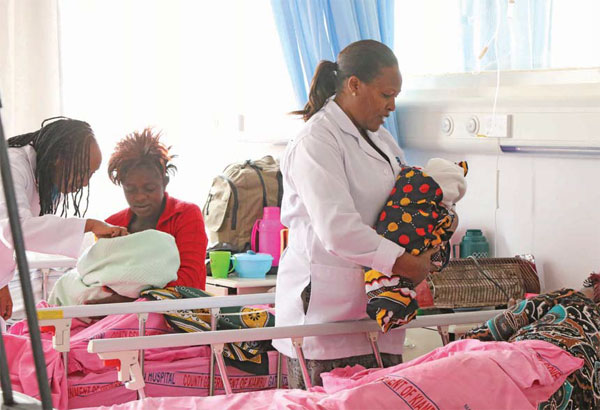Hospital upgrade is dose of good medicine
|
The new maternity hospital wing at Gatundu Hospital. Liu Hongjie / China Daily |
A Kenyan hospital that was expanded using Chinese funds has seen a 25 percent rise in patients in the two months since the new complex was commissioned.
Patrick Nyaga, the medical superintendent at Gatundu Hospital, says the upgrade means local people can now access specialized care at affordable prices.
"We're now handling referrals from 12 public clinics and three private clinics," he says, adding that the hospital's catchment area has risen from 125,000 people to 500,000.
Guohe Construction Group, based in Beijing, completed the $11 million expansion over 20 months. Funding was provided by China's ministry of commerce.
The five-story facility covers 5,300 square meters and has 96 beds, including a 12-bed intensive care unit. It also has a medical laboratory, a maternity unit and three operating theaters, as well as new a CT scanner and X-ray machines.
Kenya's hospitals are classified under six levels, depending on their ability to handle severe illnesses. Gatundu Hospital, which is in Kiambu county, about an hour's drive from Nairobi, is a level-four hospital.
"Good working conditions are critical," says Ruth Wanjiru, head of anesthetics at the hospital, who explains that, previously, there was only one operating room, which constantly led to scheduling conflicts.
"Women scheduled for elective cesarean sections would regularly have to be deferred," she says. "Priority had to be given to emergency cases, which also sometimes had to be referred to Kenyatta National Hospital, a level-six hospital an hour away."
In addition to the new equipment has come improved healthcare services. Women now have access to pre- and postnatal centers, while specialist clinics have been opened for people with noncommunicable diseases such as hypertension and diabetes.
The Kenyan government says 27 percent of all deaths and more than 50 percent of hospital admissions are due to noncommunicable diseases.
However, scaling up the hospital's infrastructure has stretched its resources.
"Just like many developing countries, our medical sector operates with limited resources and manpower," Nyaga says. "Our medical staff is lean, so we rotate them to ensure all critical departments are covered at all times."
The ICU has so far gone unused, he says, although two specialist nurses are now receiving training at Kenyatta National Hospital. Another two will be added in the future, along with more ventilators and life-support equipment, to improve emergency care services.
"We want to ensure Kenyans can access basic care, as enshrined in our national development blueprint, Vision 2030," says Stephen Njuguna, Chief Officer of Kiambu county.
China has also provided training for nine administrators to improve standards at Gatundu Hospital.
"We were trained on how to develop systems that give patients personalized healthcare," says Nyaga, who received two weeks of training in Shanghai.
China's experience in malaria prevention and control also offers a critical lesson, says Betty Kasyoka, the hospital's manager of nursing services.
"China has managed to eradicate malaria despite the presence of several large bodies of water. I think research is critical to achieving this," she says, adding that she has also been impressed with the quality of the Chinese-made drugs imported to Africa.
Last year, China pledged to build 100 hospitals and clinics in Africa at the second ministerial forum of the China-Africa Health Development, in Cape Town, South Africa.

























